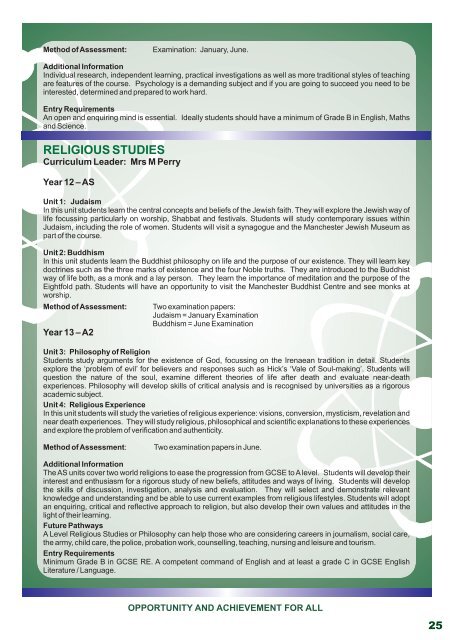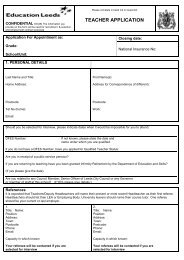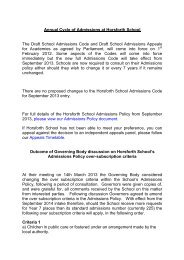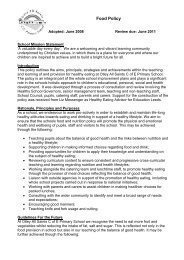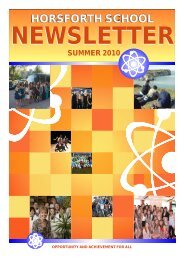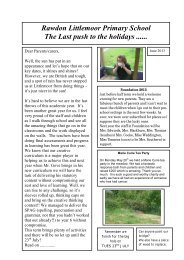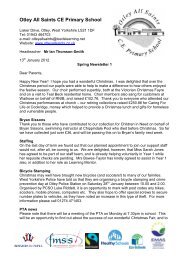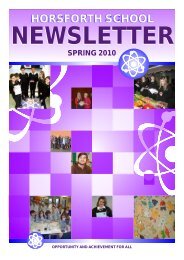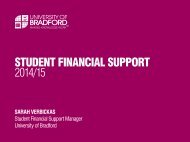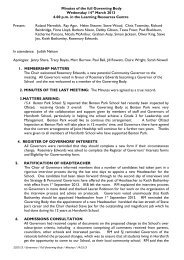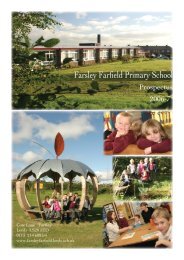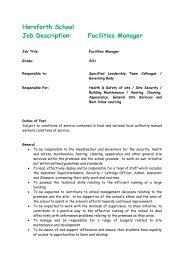POST-16 PROSPECTUS UPDATE SEP 11.cdr
POST-16 PROSPECTUS UPDATE SEP 11.cdr
POST-16 PROSPECTUS UPDATE SEP 11.cdr
Create successful ePaper yourself
Turn your PDF publications into a flip-book with our unique Google optimized e-Paper software.
Method of Assessment:<br />
Examination: January, June.<br />
Additional Information<br />
Individual research, independent learning, practical investigations as well as more traditional styles of teaching<br />
are features of the course. Psychology is a demanding subject and if you are going to succeed you need to be<br />
interested, determined and prepared to work hard.<br />
Entry Requirements<br />
An open and enquiring mind is essential. Ideally students should have a minimum of Grade B in English, Maths<br />
and Science.<br />
RELIGIOUS STUDIES<br />
Curriculum Leader: Mrs M Perry<br />
Year 12 – AS<br />
Unit 1: Judaism<br />
In this unit students learn the central concepts and beliefs of the Jewish faith. They will explore the Jewish way of<br />
life focussing particularly on worship, Shabbat and festivals. Students will study contemporary issues within<br />
Judaism, including the role of women. Students will visit a synagogue and the Manchester Jewish Museum as<br />
part of the course.<br />
Unit 2: Buddhism<br />
In this unit students learn the Buddhist philosophy on life and the purpose of our existence. They will learn key<br />
doctrines such as the three marks of existence and the four Noble truths. They are introduced to the Buddhist<br />
way of life both, as a monk and a lay person. They learn the importance of meditation and the purpose of the<br />
Eightfold path. Students will have an opportunity to visit the Manchester Buddhist Centre and see monks at<br />
worship.<br />
Method of Assessment:<br />
Year 13 – A2<br />
Two examination papers:<br />
Judaism = January Examination<br />
Buddhism = June Examination<br />
Unit 3: Philosophy of Religion<br />
Students study arguments for the existence of God, focussing on the Irenaean tradition in detail. Students<br />
explore the ‘problem of evil’ for believers and responses such as Hick’s ‘Vale of Soul-making’. Students will<br />
question the nature of the soul, examine different theories of life after death and evaluate near-death<br />
experiences. Philosophy will develop skills of critical analysis and is recognised by universities as a rigorous<br />
academic subject.<br />
Unit 4: Religious Experience<br />
In this unit students will study the varieties of religious experience: visions, conversion, mysticism, revelation and<br />
near death experiences. They will study religious, philosophical and scientific explanations to these experiences<br />
and explore the problem of verification and authenticity.<br />
Method of Assessment:<br />
Two examination papers in June.<br />
Additional Information<br />
The AS units cover two world religions to ease the progression from GCSE to A level. Students will develop their<br />
interest and enthusiasm for a rigorous study of new beliefs, attitudes and ways of living. Students will develop<br />
the skills of discussion, investigation, analysis and evaluation. They will select and demonstrate relevant<br />
knowledge and understanding and be able to use current examples from religious lifestyles. Students will adopt<br />
an enquiring, critical and reflective approach to religion, but also develop their own values and attitudes in the<br />
light of their learning.<br />
Future Pathways<br />
A Level Religious Studies or Philosophy can help those who are considering careers in journalism, social care,<br />
the army, child care, the police, probation work, counselling, teaching, nursing and leisure and tourism.<br />
Entry Requirements<br />
Minimum Grade B in GCSE RE. A competent command of English and at least a grade C in GCSE English<br />
Literature / Language.<br />
OPPORTUNITY AND ACHIEVEMENT FOR ALL<br />
25


